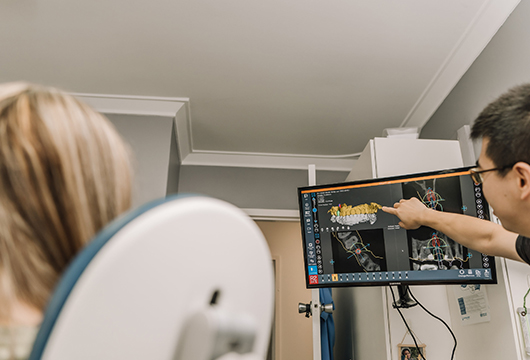Dental Implants in Hamersley


The Most Natural Way to Replace Missing Teeth Makes Possible With Dental Implants
Losing one or several teeth can be the root cause of various dental problems. They can look bad and make it difficult to eat and speak properly.
Delaying replacements for missing teeth can result in misalignment issues with the remaining teeth, which allows food debris to easily accumulate in the empty space and raise the risk of decay and gum problems. Additionally, the jaw bone can shrink with time, making a face or cheeks look saggy and sunken. Fortunately, dentistry has changed when it comes to replacing tooth loss with dental implants.
Dental implants are screw-like metal posts designed to embed directly into the jawbone so they act like tooth roots. They provide strong anchorage for artificial teeth and offer a long-term restoration. Comfort Care Dental provides an extensive range of advanced dental implants and is equipped to perform the procedure. Dentists in our clinic can create a personalised treatment plan using cutting-edge technology and a thorough oral assessment. Visit our dental clinic near Hamersley, or reach us at (08) 9349-0800.
Our Services Under Dental Implants

Multiple Implants
Comfort Care Dental offers multiple dental implants as a way to restore several lost teeth. By strategically placing the titanium posts, the process is efficient and provides a secure fit for dental prosthetics. Learn More
Implant-supported bridge
A dental implant-supported bridge from Comfort Care Dental can be a great way to replace missing teeth. Unlike a traditional dental bridge, they are supported by dental implants on either end, which means that they are much more stable and secure. Learn More
All-on-x Dental Implants
If you are missing all of your teeth or one entire arch, Comfort Care Dental can provide you with an all-on-x dental implant. It is a minimally invasive method of placing a full mouth of dental implants using only four metal posts to support a full arch (upper or lower) non-removable replacement teeth. The all-on-x implant system is one of the most advanced methods available and can be used with either dentures or dental bridges. Learn More
Implant-supported Dentures
Comfort Care Dental offers implant-supported dentures as a long-term way to address tooth loss. Unlike traditional dentures that can be loose and difficult to eat with overtime, implant-supported dentures are firmly attached to the implants and are unlikely to move around. It makes them a much more comfortable option for teeth replacement. Learn More
Single Implants
Single tooth implants are ideal for those missing one tooth. It is composed of one metal post directly inserted into the jawbone. Then, a dental crown is attached to the abutment for a full restoration and a complete beautiful smile. Learn More
Why Choose
Comfort Care Dental?

Modern Technology
Comfort Care Dental is a modern dental clinic that is equipped with advanced tools and techniques. The dentists are in our clinic are updated with the latest information to provide our patients with reliable and safe dental implants, which can result in a healthy smile.

Experienced Dental Team
We are proud of having a team of dentists who are highly skilled in performing dental implants. Also, our friendly team has substantial years of experience delivering oral care to locals. This way, it permits us to offer high-quality dental implants and other dental procedures.

Relaxed Environment
Our dental team strives to create a relaxed and friendly atmosphere for all our patients. It allows us to perform complex procedures more conveniently, such as dental implants. We also put a priority on making sure you are comfortable during your appointment.

Flexible Payment Plan
We understand that many individuals are uncertain to visit the dentist, and one reason is the high cost. So we have partnerships with reputable companies and offer a wide range of payment options to make our dental implant services accessible to everyone.
We Accept
All Payments and Health funds
Comfort Care Dental is a dental clinic near Hamersley that offers quality dental care and convenient payment options, including major health funds.
We believe that providing dental treatments should never be a second choice because of financial issues. Hence, we have partnered with reputable financing companies like Humm and Afterpay. We are also a proud provider of health funds, including Medibank, HBF, HCF, CBHS, and NIB, making our wide variety of services within your reach.
Frequently Asked Questions (FAQ’s)
How do dental implants work?
Who is an ideal candidate for dental implants?
Your dentist will closely check the condition of your teeth and gums, your medical history, and other information to determine your candidacy for the dental implant procedure. Generally, they consider the following factors:
- Healthy gums.
Anyone with healthy gums, meaning no existing gum problems like inflammation, or infection, can undergo the treatment. This is essential since dental implants are inserted below the gums and in the jaw bone. The gum tissue should be able to withstand the process of placement and healing process. - Sufficient and good jawbone density.
A good candidate must have a good amount of jaw bone that can support dental implants. It is crucial for the success of the entire procedure. - Fully understand the process.
The placement of dental implants can be more invasive than with other dental restorations, like traditional dentures and dental bridges. So, you must understand the steps and be aware of the benefits and risks of the procedures. Your dentist will be there to guide you and help you give the necessary information during a consultation. - Non-smoker.
Ideally, you can undergo the implant procedure if you don’t smoke, as smoking habits can be detrimental to the recovery period.
What are the benefits of dental implants?
Here’s the list of benefits of dental implants:
- Long-lasting.
While teeth replacements may last for 5 to 10 years, a dental implant itself can be a long-lasting dental restoration option. Providing you with new teeth that are stable and a worthwhile investment for your dental health. - Promote better oral health.
Replacing your teeth can be beneficial to your cosmetic (appearance) and overall oral health. It keeps the chewing force of your teeth intact and avoids the possible consequences of not replacing missing teeth, such as misaligned teeth, poor bite, tooth decay, etc. - It preserves the other teeth and jawbone.
Losing a tooth and delaying restorations can allow the surrounding teeth to move towards the gap, posing a risk of spacing issues and decay. Also, bone density can deteriorate with time without the chewing simulation. But dental implants address such dental issues and improve areas of lacking. - Improve the appearance.
Without teeth, the face can sag and appear sunken. Fortunately, dental implants can allow you to retain the natural shape of your face and give a youthful look with new teeth. - Improve speaking and chewing.
Missing teeth can affect how you pronounce certain words and can be difficult to chew. But dental implants can address such a problem by replacing them with roots for better chewing ability.
Are dental implants safe?
What is the process of getting dental implants?
- Consultation.
The first step in getting dental implants is for your dentist to determine if you’re a good candidate for the procedure. They will check the quality of your jawbone to see if there is adequate support for the dental implant and evaluate the ideal position for the metal posts. - Treatment plan.
They will also take into account the number of implants you need and create a treatment plan. Once you and your dentist agree to proceed with the surgery, you can schedule a date for the procedure. - Placement.
The next step is to have the dental implant placed. It is a surgical procedure that is usually done under anesthesia. After numbing the area, your dentist will make a small incision on your gums. Then, drill holes deep into the jawbone where your dental implants will be inserted. - Healing time.
Your wound and bone are given time to heal so that new bone grows around the implant. This is called osseointegration, and it usually lasts for three to six months. - Attaching the abutment and artificial teeth.
Once the implant is secured to the bone, a small connector called an abutment is attached to the implant. Your dental professional will take an impression that will be used to fabricate a crown, bridge or denture. Once fabricated, the finished crown, bridge or denture will be attached to the implant.
What are the possible risks of dental implant procedures?
Dental implants have associated risks similar to any dental procedure, and it’s important to be aware of them before treatment. Although, your caring dentist will do everything to minimise potential problems and make the procedure as smooth as possible.
- Damage to the surrounding teeth.
- During the procedure, it may be possible to injure the surrounding oral structures or tissues, such as sinus cavities.
- Risk of infection at the implant area.
- Nerve damage can cause numbness of the lips, gums, teeth, and chin.
- Sinus problems may occur when the implant is positioned in the upper jaw and extends beyond one of the sinus cavities.
What is the difference between implant-supported dentures and traditional dentures?
Traditional dentures are removable; they usually hang on the gums and are supported by denture adhesive and suction from the mouth’s roof (palate) or floor. Since they are not securely attached, they tend to loosen over time. In contrast, implants are generally considered to be more comfortable than traditional dentures, as they do not shift or slip in the mouth. They also provide better support for the denture, making it less likely to loosen or fall out.
Additionally, implant-supported dentures stimulate the jawbone, helping to prevent bone loss. However, implants require minor surgery to insert the titanium posts.
How much do dental implants cost?
How long do dental implants last?
What is the best way to care for dental implants?
Dental implants are similar to natural teeth in the sense that they are low-maintenance and do not require much care. However, it doesn’t mean that you can skip your oral hygiene habits. Doing so can put them at risk of decay and may deteriorate with time. Like natural teeth, it is important to follow your dentist’s tips on how to take care of them so that they last as long as possible.
- Brush your teeth twice daily using a soft-bristled toothbrush.
- Opt for less harsh toothpaste; avoid those with crystals in them.
- Floss daily using implant-specific floss or unwaxed tape.
- Ensure you’re also brushing around and under the implant crown.
- Use an interdental brush to reach certain areas.
- Ask the dentist for a recommended oral irrigator.
